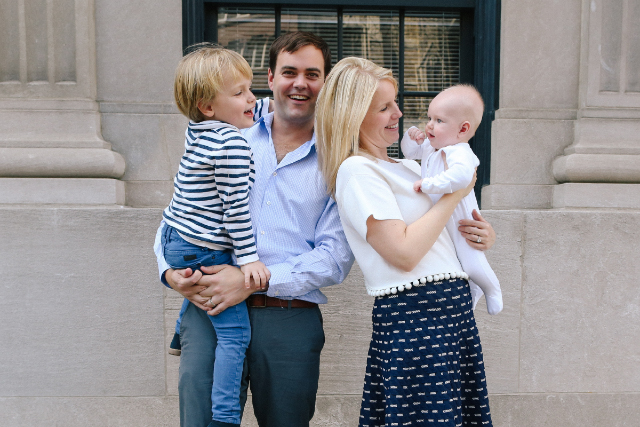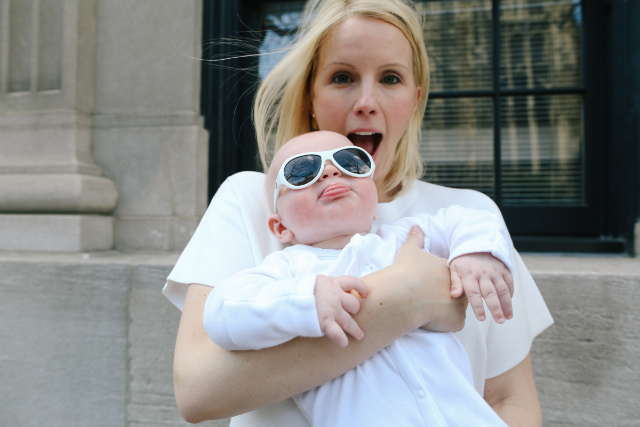With Babiators, engineer-entrepreneur has found her place in the sun
Standing under a shimmering, South Carolina sun, Molly Fienning, A.B. ’02, had her eyes on the sky as a line of fighter jets landed nearby. She stood alongside a group of Marine Corps families who had turned out to greet their loved ones after a training mission. While waiting for her husband, Ted Fienning, A.B. ’01, to land his jet, she noticed something—nearly all the parents wore sunglasses in the midday glare, but their young children did not.
“The kids were squinting into the sun and complaining about not being able to see the jets and their dads,” recalled Fienning, an engineering sciences concentrator at the Harvard John A. Paulson School of Engineering and Applied Sciences.
Fienning, who had worked in the tech industry before marrying her husband and moving to a Marine Corps base in rural Beaufort, South Carolina, saw a potential entrepreneurial venture. Her idea was to produce lightweight, durable, and stylish sunglasses for babies and young children. In May, 2011, Babiators was born.

Ted and Molly Fienning with sons Sawyer (left) and Fox. (Photo provided by Molly Fienning.)
The Fiennings enlisted the help of friends and fellow Harvard alumni Carolyn, A.B. ’03, and Matthew Guard, A.B. ’02, consultants who were looking for the right entrepreneurial niche. The couple latched onto Babiators, lightweight sunglasses that are produced from soft rubber, which bends more easily than plastic frames. Those rubber frames make glasses that are durable, and also feel more comfortable on a child’s sensitive skin, so he or she will likely wear them for a longer period, Fienning explained.
Since the potential for lost or damaged sunglasses keeps many parents from buying them for young kids, Babiators launched with a rock solid guarantee—if a customer’s sunglasses are misplaced or broken within a year, the company will send a free replacement pair.
In the beginning, Molly and Carolyn made cold calls to stores from their kitchen tables. Within 30 days, they had recouped their initial investment in the firm, and after only six months, Babiators were being sold in 300 stores.
“Babiators took off really quickly,” Fienning said. “We focused a lot of our marketing dollars on educating customers. Kids get about three times the amount of sun as an average adult and, due to their larger pupils and clearer lenses, more UV rays penetrate their eyes and can cause irreversible damage.”
That eye safety message resonated with parents, including celebrities like Neil Patrick Harris and Jennifer Garner, whose kids sported Babiators for the paparazzi. The fact that the colorful, kid-friendly sunglasses make for adorable photo ops (while providing 100 percent UV protection) helped propel the business at a lightning pace. Within nine months, they had secured Nordstrom as their first major account. That quick expansion led to a few growing pains for the fledgling firm.
Fienning recalls the excitement she and her co-founders felt when their product was featured on “The Ellen DeGeneres Show,” receiving a glowing stamp of approval from the influential host. When the episode cut to commercial, Fienning’s joy transformed to frustration as the Babiators site instantly crashed due to an overwhelming number of visitors.
“That definitely taught us a lesson in being over-prepared,” she said. “We learned a lot about scale and to be ready for more than what you think is coming your way.”
The co-founders took those lessons to heart as the firm has continued to grow. Babiators recently sold its one-millionth pair of sunglasses and distributes its products to 3,000 stores and 45 countries. In celebration of the company’s fifth birthday, they gave away 10,000 pairs of sunglasses in less than 2.5 hours.
Now that the company’s place in the market has been firmly established, Fienning is turning more of her attention to the Babiators educational campaign. Currently, only about 30 percent of adults safeguard their kids’ eyes from the sun.
“The question that has driven us from day one has been, ‘What difference is our company going to make in the world?’ Products come and go. For us, Babiators is about getting the word out and protecting kids’ eyes,” she said.
